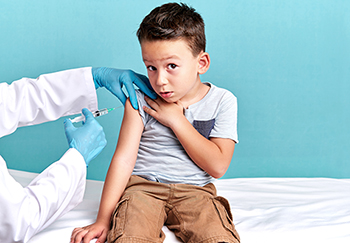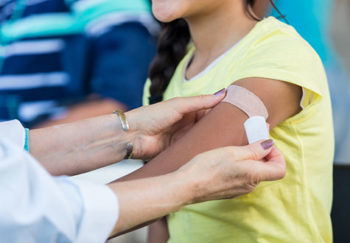
Parents, by and large, make decisions based on what they believe is best for their child. But it can be hard to sift through the vaccine myths and facts with so much misinformation floating around. It seems nearly impossible to scroll through the news headlines lately without seeing something about vaccines, vaccine-preventable disease like measles, or pro- and anti-vaxxers.
So, I polled some of my friends and family about things they’d heard about vaccination, whether or not they believed them to be true. Then I talked with John Gazewood, MD, to sort out the facts.
What Are Vaccines?
First, it’s important to know what vaccines are. There are many different types, but the idea is always the same: to train the body to deal with a potential future invader, or antigen, such as foreign bacteria or viruses.
Vaccines use weakened or even dead viruses or bacteria. These trigger our bodies to create antibodies to fight and destroy them. That way, if we ever are exposed to the real thing, our body already has the antibodies to destroy it before it can make us sick.
Vaccine Myths vs. Facts: Autism, Vaccine Shedding & Alternative Schedules
Vaccines contain heavy metals that are toxic to our bodies.
Myth. The exact contents of a vaccine depend on the type of vaccine. The measles, mumps and rubella (MMR) vaccine is an example of a live, weakened virus vaccine. The viruses in the vaccine aren’t strong enough to infect the person, but they are strong enough to cause an immune response prompting the body to create the antibodies and provide future immunity. Other vaccines come from viruses or bacteria that have been grown in a culture, then killed.
Typically, there is some sort of preservative, but more and more vaccines are preservative-free. Thimerosol, a type of mercury, is one type of preservative found only in multi-dose vials of the flu vaccine, in very small amounts. Some forms of mercury are toxic, but thimerosal is a type of mercury the body the body can’t absorb or metabolize, so it just goes straight through the system.
Giving multiple vaccines at once can overwhelm a young child’s immune system.
Myth. Some parents worry about overloading their child’s immune system by giving too many vaccines at once. Some even elect for alternative vaccine schedules to spread out vaccinations. This doesn’t do anything but increase the child’s risk of being exposed to something before they’ve been vaccinated against it. The truth is that a person’s immune system is exposed to many more germs and viruses every day than what’s in vaccines.
Vaccines make people sick.
Myth, but there can be minor side effects. Vaccines don’t make people sick, but they can cause minor side effects for a day or two. This is because of the immune response that vaccines create in our bodies. Our immune systems recognize these foreign proteins and go to work fighting them – creating antibodies.
Those antibodies are ultimately what create our immunity, and they can cause things like low-grade fever or fussiness in babies. Those symptoms are often similar to what happens when our bodies are fighting a cold.
The flu shot is useless, since it makes you sick and you still get the flu.
Myth. “You cannot get the flu from the flu shot,” Gazewood says without question. You may get some of those immune response symptoms, but those:
- Are minor
- Only last a day or two after getting your vaccine
- Aren’t the same as having the flu
However, the influenza virus constantly mutates, and each year’s flu vaccine is just the best guess at which strain or strains of flu will be most prevalent the coming flu season. “It’s an educated guess, and some years it ends up being a much better match than other years,” explains Gazewood.
If the actual strains end up being different than the ones in that year’s vaccine, you could still end up catching the flu, even if you were vaccinated. If you do end up getting the flu, you’ll generally have a milder case than if you hadn’t been vaccinated that year.
Vaccine “shedding” is real and is a risk recently-vaccinated people pose to others.
Mostly myth. Vaccine shedding refers to a person who has recently been vaccinated infecting others with the disease. It is possible, though very uncommon, to “shed” a virus after receiving a live virus. However, the person would shed such small numbers and such weakened strains of the virus that they would not be infectious.
My infant doesn’t need vaccines because I’m breastfeeding.
Myth. “That’s a good question, because infants do get antibodies from their mothers, and we know that babies that are breastfed are less likely to get colds and things like that,” explained Gazewood. But breastfeeding doesn’t offer sufficient protection, especially against these really serious diseases we vaccinate against. Breastfed infants who aren’t vaccinated can certainly still contract these serious diseases.
You can’t get the HPV vaccine after age 22 because you probably already have it.
Myth. Current recommendations suggest giving the HPV vaccine to people up into their 40s. However, Gazewood notes that insurance coverage hasn’t caught up with this recommendation. If you’re an adult considering the HPV vaccine, talk to your primary care doctor, and check with your insurance company if you’re unsure it will be covered.
Live vaccines can cause problems if you have an autoimmune disorder.
Fact. If a person is immune-suppressed, or on an immune-suppressant medication, doctors will not administer live-virus vaccines. If you’re immune-suppressed, even the weakened virus in these vaccines could make you sick. Some vaccines, like MMR, only come in a live-virus vaccine.
It’s important for the people around an immunosuppressed person to be vaccinated to reduce that person’s chance of becoming infected, since they cannot be vaccinated themselves.
Disease rates have dropped for reasons other than vaccines.
Fact, in some instances. “For example, we have much less tuberculosis (TB) than we used to have, because we have better living and sanitary conditions. We also don’t see a lot of cholera in the United States anymore because we have great sanitation that deals well with these kinds of things,” Gazewood explains.
“However, most disease rates have dropped because of vaccines. There is nothing magical in our environment that protects us from pertussis or measles. I think the recent measles outbreaks have been a great example of that. If you don’t have a vaccinated community, you’re going to get measles in that community.
Find a Doctor Near You
UVA has more than 100 primary care doctors, nurse practitioners and other providers. Find a PCP in your community.
“I’ve been in practice almost 30 years, and when I was first in practice, we used to see lots of kids with meningitis, caused by pneumonia or Hemophilus influenza type b (Hib). When they introduced the pneumonia (Pneumococcus) and Hib vaccines, there was a dramatic difference. Within a year, you just weren’t seeing those diseases anymore.”
Vaccines cause autism.
Myth. “This one is totally false,” Gazewood says. “The man who published the original article that showed a link between vaccines and autism falsified his data.” Not only was that article retracted, the author lost his medical license. Time and time again, studies have shown no link between vaccines and autism.
Seizures and other negative side effects are associated with common vaccines for newborns and young children.
Mostly myth. There is an extremely small chance that the vaccine could cause a fever high enough to induce a seizure, just as fevers from illnesses can also cause a seizure. However, that seizure is a one-time event and is not the same thing as a seizure disorder or epilepsy. A vaccine will not cause a seizure disorder. The chance of a high fever used to be more common in the old pertussis vaccine. The new pertussis vaccine isn’t as likely to cause a high fever or other reactions as the old one was.
Natural infection offers better immunity than vaccination.
Plausible. “In some conditions, maybe,” Gazewood considers. “For example, if you contract hepatitis B and clear that infection, maybe you’ll have better lifelong immunity than if you had just gotten the hepatitis B shot. But the possible benefit is so negligible compared to the risk of getting the actual infection.” It’s not worth the risk.
Vaccines Have Caused Stronger Versions of the Virus to Circulate
Myth. Bacteria can develop a resistance to antibiotics. But vaccines are different: They use your body’s own immune system to develop immunity against that virus or bacteria.
There aren’t good studies about these vaccines.
Myth. For any of these vaccines to be approved, there have to be very large studies that have to prove not only the effectiveness but also the safety of the vaccine. There are ongoing reporting systems for side effects, so there is lots of good science that show these vaccines are both very effective and very safe.
Vaccines save lives.
Fact. Gazewood says, “When I go visit my family’s cemetery in Texas, I can always see my grandmother’s siblings that died under the age of 5 from vaccine-preventable diseases. Of her eight brothers and sisters, five of them died before they were five years old. There is no doubt that vaccines save lives.”
Editor’s Note: We’ll be talking about delayed vaccine schedules on the blog tomorrow, so check back in!

